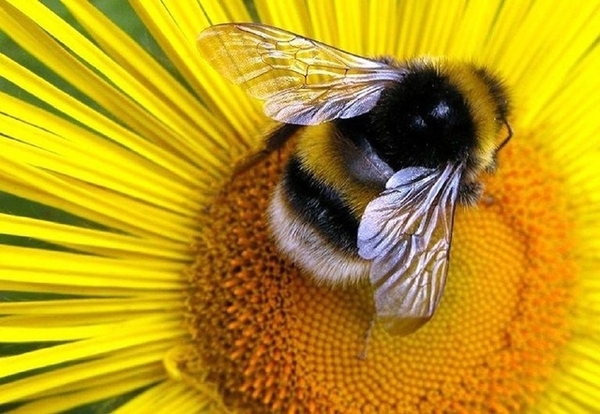Blog

Why are bees important?
Wednesday 4th December 2019
With its black and gold stripes, translucent wings and signature furry body, the bee is a common sight in woods and gardens around the world. But do you know how important this creature is to our planet, and the threats it is facing?
The honey bee is one of our most important pollinators
Often seen buzzing from flower to flower, it’s as difficult to imagine a life without bees as it is to envisage one without trees. These hard-working winged invertebrates have been around for millions of years, pollinating our plants and producing the sweet golden syrup we call honey.
A world without bees is sadly becoming more of a possibility, as these important insects are in severe decline. If bees were to become extinct the planet could be in serious trouble, because these creatures are such an integral part of most ecosystems.
Why are bees important?
While to many they are simply the fuzzy flying insects we see darting among the flowers during the warmer months, bees are actually so much more than this, and have an important part to play in maintaining our planet. Where trees and woods are essential to filter our air, bees are vital to both pollinate the food we need to survive and pollinate many of the trees and flowers that provide habitats for wildlife.
Perfect pollinators
Bees are our predominant pollinators, pollinating a third of the food we eat and 80% of flowering plants. Pollination is crucial because many of our vegetables, fruits and the crops that feed our livestock rely on it to be fertilised, so without it, we could go hungry. Vegetables such as broccoli, asparagus and cucumber rely on the pollination of bees, as do apricots, strawberries, apples, tomatoes and almonds.
While there are other methods of pollination, including by the wind, birds, bats and other insects, wild bees are among the most important pollinators because they are capable of pollinating on a much bigger scale. It has been estimated that it would cost farmers in the UK an incredible £1.8 billion per year to manually pollinate their crops, which just further emphasises the importance of bees.
The importance of honey
As well as being pollinators, honey bees, Apis mellifera, also produce honey. This sickly sweet golden liquid is a valuable product not only for its saccharine taste, but also due to its medicinal properties and the fact it is so energy dense.
Why are bees disappearing?
Bees are in decline on a global scale as they face many threats, from habitat loss to the use of toxic pesticides. Many of the threats to bees share parallels with the threats to trees and woodland, so saving bees goes hand-in-hand with saving trees. If these threats aren’t brought under control, we could be looking at a future without bees.
Habitat loss
An increase in urban developments and invasive farming methods has meant that many of the areas bees once called home no longer exist. These developments are as much a threat to bees as they are to trees and woodland. In the wild, several species of bee nest in hollow trees, so as more trees are destroyed so are the homes these bees live in. Wildflower meadows and other areas abundant in flowering plants are also in serious decline, meaning that bees lose an important food resource.
Use of pesticides
One of the main threats to our beloved bees is the use of toxic pesticides. Whilst pesticides are designed to kill pests, due to their intense toxicity they are having an adverse effect on other insects too, including bees. Neonicotinoids in particular cause bees a great deal of harm, as when they are sprayed onto plants they are absorbed. So, when a bee comes to pollinate said plant, it will ingest this pesticide. This can seriously damage the bee’s central nervous system.
Climate change
Climate change and the extreme weather it often causes is another contributing factor in the decline of bees. It disrupts bee nesting behaviour and alters the normal seasonal timings, meaning flowers may bloom earlier or later than expected. Whilst the planting of more trees is helping to mitigate some of the effects of climate change, it is still a serious issue that could prove deadly for many of our bees.
Parasites and diseases
Parasites and diseases are another big threat to bees. The varroa mite, Varroa destructor, is a parasitic mite which clings to the back of the honey bee, passing diseases and viruses to it and gradually draining its strength.
Invasive species
Non-native species can pose another threat to bees. Some species in particular can cause havoc for native species – the Asian hornet, Vespa velutina nigrithorax, eats honey bees and so poses a huge threat.
How you can help bees
Luckily, it’s not too late to help save the bees from extinction. There are lots of things you can do to help protect these important creatures - most of which can be done from the comfort of your own garden.
Fill your garden with bee-friendly flowers
One of the easiest ways to help out bees is by planting lots of bee-friendly flowers in your garden. Bees favour a wide range of flowering plants, including foxglove, birdsfoot trefoil and red clover!
Provide shelter for bees
Like most invertebrates, bees need shelter to nest and hibernate in. You can create your own shelter or buy a ready-made bee and insect house – just hang it up in a sunny sheltered spot in your garden and watch bees filling the tubes during the spring and summer months.
Stop using pesticides
Pesticides are one of the key threats to bees, and so one way to help bees is to stop using them in your own garden. Some pests provide food for crucial pollinators, so leaving them to be controlled naturally is the best choice if you want to help save bees.
Help a bee in need
Often during the summer months you may spot a solitary bee sitting unmoving on the ground. Whilst it is easy to presume it might be dead or dying, chances are it is actually exhausted and in need of a quick pick-me-up. You can help out a tired bee by mixing two tablespoons of white, granulated sugar with one tablespoon of water, placing it near the bee so it can help itself to this homemade energy drink.



